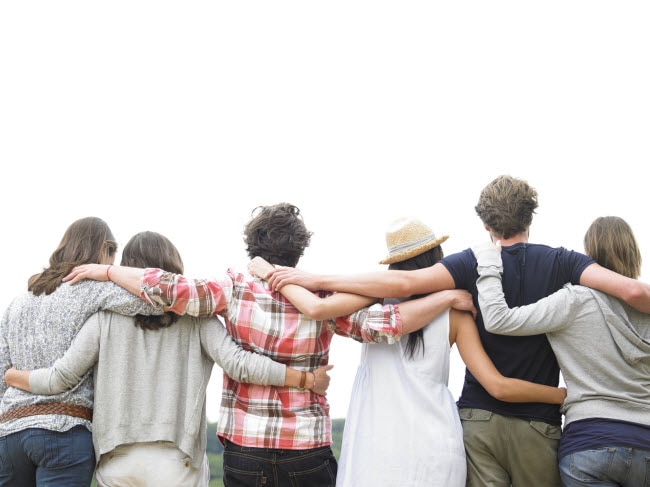When the Blue Zones were first identified in a 2005 National Geographic cover story entitled “The Secrets of a Long Life,” many were pleased to find that they were already practicing these region’s keys to longevity: regular exercise, a plant-based diet, moderate alcohol intake, and savvy stress-reduction strategies.
But one of the more surprising “lessons” provided by people in Blue Zones—people who statistically live the longest—was the priority they placed on socializing. Indeed, friends played a significant role in their overall robustness and ability to reach centenarian status. A 2010 study confirmed this, showing that “the effect of social ties on lifespan is twice as strong as that of exercising, and equivalent to that of quitting smoking,” Live Science reports.
It makes sense, once you think about it. Our evolutionary lines trace back to tribes: groups of people who worked together, relaxed together, loved together. And yet, with the advent of technology, and even far prior, we began to move away from a collective culture to an individualistic society—perfectly capable of nailing the basics of sound health through nutrition, physical activity and sleep, but missing an essential ingredient: Friendship.
And yet, study after study—beyond the research conducted on those who hail from Blue Zones—consistently demonstrates that relationships, and not just romantic, are critical to our overall well-being, and that its inverse, isolation, can wreak havoc on our health. Intrigued? Here are four ways friendship nourishes your health—and why you should give your bestie a shout-out:
1. Friends can serve as a positive influence
There are friends—perhaps from your youth—who may be great fun but who are undoubtedly toxic: They encourage that extra slice of cheesecake, they egg you on to order a second drink, they dissuade you from Pilates and drag you to a store neither of you can afford instead. (“Misery loves company” comes to mind here.) But trustworthy, good friends—the ones who want to see you at your best—can be a remarkably positive influence on you instead: They cheer on your decision to quit smoking, embolden you to make wise decisions in love and work, and are right there beside you on the trail when you decide to start jogging.
Similarly, friends can inspire you to take better care of yourself through their own behaviors. That girlfriend who insists on a yearly mammogram; that college pal who took off 20 pounds naturally? You may have something to learn from them.
2. …and as a cure for loneliness
Recent studies have shown that social isolation is just as deadly as obesity, with research revealing that elderly people who went without sufficient social interaction were twice as likely to die prematurely. Meanwhile, CNN reports that “even a single instance of exclusion can undermine well-being, IQ test performance and self-control.” Sound incendiary? Think again. The National Institutes of Health exposes that isolation comes with consequences that can range from increased inflammation to impaired immune function.
Friends, meanwhile, can offer an ear when you need to talk through a problem with your partner, a shoulder to cry on during a death in the family or a warm hug after a particularly rough day at the office. From a health perspective, the benefits of this sort of support can be huge, including lower blood pressure and enhanced hormone function.
3. They can also provide you with a sense of purpose
Part of the success of support groups such as AA is credited to the sense of purpose people derive from building bonds with others in their network. The desire to drink may persist, but making a commitment to a friend can strengthen one’s resolve.
Buddy-systems—whether it’s for working out at the gym or going on the Whole30 diet—operate in a similar manner: It’s far harder to ditch a resolution when you’re not the only one involved. When you feel that your life has purpose and meaning, Psychology Today affirms, “you may be less likely to develop sleep problems, have a heart attack or die prematurely.” In other words, pencil in a regular hiking date with a pal—and stick to it. (Bonus points: exercising with a friend can boost your pain tolerance.)
4. …and a sense of belonging
One of our most potent emotional and psychological drives is to feel connected. To walk into a room and feel the warmth of a friend’s greeting may be one of the most underrated emotions in the world, yes, but the human need to belong is as essential as food and shelter.
Social psychologist and Stanford professor Gregory Walton’s studies on the subject “demonstrated that a sense of social belonging can affect motivation and continued persistence, even on impossible tasks. That is, if you don’t feel like you belong, you are both less motivated and less likely to hang in there in the face of obstacles.”
But what if you’re an introvert? Work towards finding this sense of belonging through a group endeavor, whether it’s a local book club, a community garden, or a city softball team. And remember William Penn’s words that “A true friend advises justly, assists readily, adventures boldly, defends courageously, and continues a friend unchangeably.” Your health will amply thank you for it.



